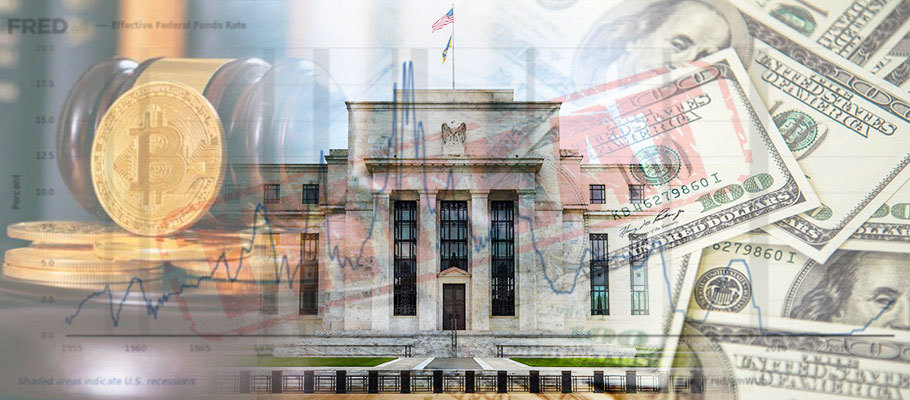
Published: February 18th, 2020
– February 2020 has been a great month for Bitcoin and cryptocurrencies in general. The world’s first cryptocurrency has gained more than $2500 this year and is still bullish. The other coins are doing just as impressively. As if this is not enough good fortune for crypto, Chair of the Federal Reserve Jerome Powell admitted that digital currencies are capable of presenting the dollar with systemic risks, an assertion that fueled the surge in cryptocurrency prices.
After a brief hiatus, Jerome Powell, the Chair of the Federal Reserve of the U.S. resumed his testimony before the Congress on Wednesday where he made some very damning admissions.
First, Powell said the U.S. economy was in a sad state; which is contrary to popular opinion. Second, he contended that the economy was not civilized enough to operate under a normal monetary policy without financially self-destructing. Importantly, Powell admitted that the pace of development in the blockchain space could make crypto a systematic risk to the greenback sooner than the financial world anticipates.
It is this last admission that got cryptocurrency enthusiasts giddy and sent the price of digital coins soaring. Bitcoin, which had ended the week above the $10,000 mark continued on a bullish trend while Ethereum is continuing on an upward trajectory and is now (February 16, 10:19 UTC) standing at slightly over $270.
The cryptocurrency markets had earlier gotten excited when Bill Foster, the U.S. Representative for Illinois's 11th congressional district while questioning Powell, suggested that the U.S. keep pace with China regarding government-backed cryptocurrency ambitions.
During the testimony, Powell said that the theoretical implementation of Libra by Facebook has changed the lay of the financial world. He admits that this implementation has aroused his institution’s attention to the importance of moving swiftly towards digital currency.
After the most powerful man in the world of finance made the admissions, it is easy to understand why Bitcoin managed the prolonged rally.
Powell’s fears are shared by other prominent industry experts. In an opinion piece issued by the World Economic Forum (WEF) in November, Peter Lyons of Lapa Capital and John Liu from Fusion Foundation said just as much. They contend that digital currencies have the capability to modulate the systemic risks presented by the dominant position of the dollar as the global foreign currency reserve.
According to the IMF, the dollar constitutes 62% of all foreign reserves held by central banks globally.
The realizations highlighted above brought more life to a cryptocurrency market. After Jerome’s admission, the cryptocurrency markets got revved up with Bitcoin picking 4% gains to stand at $10,200.
While answering Foster, the chair of the Federal Reserve revealed that the U.S. was pursuing several IoT and blockchain projects and may be miles ahead of China in this endeavor.
Jerome’s response also served to quell the fears raised by Foster. According to the House Representative, China harbors tremendous ambitions in the blockchain and digital currency sphere. The congressman understands that Chinese aspirations could pose a threat to the greenback and its place as the global reserve currency.
Cryptocurrency enthusiasts in general and Bitcoin investors, in particular, took Powell’s assertion as a positive indicator.
Despite the impressive response the cryptocurrency markets are giving, Powell remains cagey on the issue of the digital dollar. Conceptualizing and implementing the project has come to an abrupt but hopefully temporary halt because of the privacy pitfalls. The U.S. seems averse to the idea of keeping an open ledger where everyone’s payments are recorded; an issue that China clearly has no qualms about.
The U.S. may need to be a little bold in this regard if it wants to go with China toe to toe. The orient country has already outlined an elaborate plan to launch a digital currency. The Digital Currency Electronic Payment (DCEP) project was initiated five years ago.
China says that the goal of the project is to cushion its economy especially at a time when other forms of payment may permit the illegal flow of money. Economists, however, think that there is more to the project than meets the eye. Keyu Jin, a professor at the London School of Economics says that China’s biggest motivation to develop a digital currency has a lot to do with the country’s need to leverage the Digital Yuan as global payment currency.
Michael Sung who teaches at the Fudan University in Shanghai agrees with Prof Keyu. However, he says the motives are a lot more than just leveraging the Digital Yuan. He believes China’s dabble with crypto, in the light of the latest developments in the U.S, is also a measure meant to counter the effect of Facebook’s Libra.
While China’s ambitions started way back, the U.S. seems to have joined the fray just last year. Sometime in September 2019, House Representatives Bill Foster and French Hill encouraged the U.S. government to consider developing a government-backed cryptocurrency. The two thought that doing so would help the U.S. to remain competitive.
This request prompted Powell to announce a month later that the Federal Reserve was considering a project along such lines. He added during the announcement that the central bank was assessing and will continue to analyze the benefits of pursuing a digital currency project as well as the costs associated with the venture.
These efforts still fall short of the strides that China has accomplished. Already, Beijing is planning to power its signature Belt and Road Initiative using crypto.
By admitting the potentials that Bitcoin and other cryptocurrencies have, Jerome Powell may have just hoisted these coins on a pedestal that may take them to mainstream adoption. While this admission has helped push the price of most coins, it also alerts central banks on the need to launch government-backed digital currencies. Whether the banks will respond before cryptocurrencies become an unstoppable threat remains to be seen.